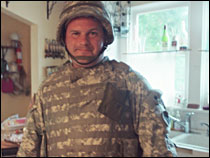Deployment Hard – But Financially Beneficial
By Katie • Jun 29th, 2009 • Category: Featured, Finances, Guard/Reserve Issues, Parenting, Passing the Time, RelationshipsHere’s a post by Sarah Gilbert, who’s husband is an Army reservist deployed to Afghanistan. She writes honestly about how the financial windfall associated with a deployment helped her family.
You can read the original story here.
 I don’t know whether it was minutes or hours or even a day: the time it took me to understand that my husband, Jonathan, was really being deployed.
I don’t know whether it was minutes or hours or even a day: the time it took me to understand that my husband, Jonathan, was really being deployed.
“July 17,” he’d said.
That was in May, and that day he thought he was going to Afghanistan. At first I almost laughed; he’d threatened to go when we had argued about disciplining our boys, or when I complained about overdue bills or our lagging mortgage payment. This was his logic: He could leave the child rearing to me, and I’d have his twice-monthly paycheck as solace.
“You’re not going to solve this by going to war!” I’d say. It was off the table, in my opinion.
I started writing about it, because this is how I deal with things. “Afghanistan,” I wrote, and “mobilized” and “two months.” I knew much, too much, about Afghanistan. We keep NPR on almost all day, and the radio on with BBC when we fall asleep. When our toddler wakes up to nurse at night, I obsess over the news about the too-long-war-torn country: a story about inordinately high maternal death rates in the country has stayed with me for years. It seems dangerous but alluring; if I was in my 20s and childless I’d probably be heading there myself to volunteer as a doula.
For a minute I wish it was me going. Just for a minute.
He’d been an Army reservist for four-and-a-half years, and I’d begun to believe he’d never be called up. He’d joined after I found out I was pregnant with our second son, Truman, which was coincidentally the day before I was laid off from the startup where I was working. No health care, pregnant, the two of us jobless: the reserves seemed a great option. He’d harbored a longing to serve his country as long as he could remember, and now he could do so and provide for his family.
We were covered through the first few months of Truman’s life, and several months later I got hired full time by the company I’d been contracting for, with benefits. As I made most of our family’s income, he rose through the ranks, going here or there around the country for special training and domestic support for his unit. It had taken him a long weekend to become a combat life saver; he’d spent three months and earned two medals supporting members of his unit headed to Afghanistan; he was qualified to handle ammunition; as a newly-minted sergeant, he now had several young reservists to take under his wing. He won third place in the Army’s “truck rodeo” for his skills backing up enormous military trucks precisely. He hadn’t really spent much time trying to find a full-time job, given my income and his frequent stints of duty. He worked for a friend’s landscaping business when business was booming and helped out with the kids when it wasn’t.
But recently, we’d decided it was time for him to find a “real” job, and we’d just started working on it in earnest; I, having quit my own full-time job, was freelancing again with the hopes of writing a book. According to the Oregon Department of Human Services, we were broke enough to qualify for the full food stamp benefit. (With three children and most of our income coming through my self-employment, we were ringers.)
And then we got the deployment news.
Still in disbelief, I could only think practicalities. I began to google “military pay tables” and started counting the dollars. Having always worked for the private sector, where I signed contracts noting I wouldn’t disclose my salary to anyone, it bowled me over how transparent these numbers were. E-5, more than four years, $2,334.90 a month in two different paystubs. Plus a dizzying list of extras and allowances: Basic Allowance for Housing, with dependents, $1,084.00. Family Separation Allowance: $250. Basic Allowance for Subsistence: $323.87. And once he gets overseas, he’ll earn the surprisingly tiny pay of $375 combined for Hazardous Duty and Imminent Danger and be excluded from taxes. Total: $4,367.77 a month.
I am amazed that I can know this to such precision, his earnings overseas, when I cannot even believe it is happening. Instead of focusing on the realities of his leaving, I try to focus on the calculations. The numbers calm me, help me quiet the constant presence of the war in the news. As if from a great distance, I imagine myself, in the future, obsessing over a headline involving Afghanistan; a short news segment about a National Guard member’s death. And then I return to the realities of my days, deciding which bill to pay first, what we’re having for dinner.
Many days after receiving news of his deployment – after we’ve started receiving what seems like vast riches in food stamps, and I have calculated when we’ll stop qualifying for them (in September) – I learn he isn’t going to Afghanistan at all. Instead, his superior officers have offered him up to an infantry unit headed to Iraq. There he’ll be driving trucks, probably in the midst of danger. Imminent danger hazardous duty.
My heart squeezes into my throat and I am not hungry for the food I have brought home from the farmer’s market and am feeding to the boys: asparagus and green garlic and bagels and the occasional nibble from a few sticks of “porkeroni” that they love.
Because it hurts too much to think about 15 months here without my husband, the boys without their father, I scribble numbers on scraps of paper, planning how we’ll use his paycheck to compensate for the impossible and impossibly dull list of things there is to do before he can even get his official orders. He must receive his official security clearance before he can be mobilized; it’s more demanding than any paperwork I’ve ever done, requiring extremely detailed information about our past together as well as his third set of official fingerprints.
As I type in every job he’s worked in the past seven years and whether he’s been 90 days late paying a bill (of course), I am thinking to myself that we will pay $200 a month to Jonathan’s great-uncle, who has always helped him when it was needed; $200 a month to my dad, who helped us with the mortgage once when we were behind. As we cash a check for $40 I’ve received so we can pay $20 for yet another copy of his fingerprints on form FD-258, I console myself with the fact that we will pay extra on my student loans each month. As we scan in documents to e-mail, then fax, and mail, just for good measure, to someone in Oklahoma, we decide to send money each month to my middle sister, who with her husband, part of the Wounaan tribal group, runs a faith-based home for indigenous teens in Panama.
I also tell Jonathan that in no way will we alter our car-free lifestyle, even for a hybrid; so he tells me he will spare no expense to refurbish the vintage Schwinn in our basement when he gets home. In November 2010.
We have already told everyone when they can start expecting money from us when we learn that he may not be mobilized until September.
It is the way of the Army, that every day is another duplicate, triplicate piece of paperwork; that we can calculate his earnings to the penny; that we will not know until he actually “ships” for sure, for totally actually certain, when or where or with whom he will go. It could change at any time. It could be delayed, or moved up, or left where it is after having been canceled, then reinstated.
So I must work each day, write things for pay and cook nourishing food for our boys and juggle our utility bills and never know if it will be months or weeks or days before the numbers we have written down on scraps of paper become dollars in our bank account, before that unbelievable separation – I’ll be a war wife! – begins. I thank the heavens that we are on the pleasant end of the spectrum of reservist financial situations; many families whose reservists daddies go to war are dependent on bigger salaries than the ones you can find in the military pay tables; for them, war is a financial minefield, too.
For us, it is a Godsend, and though that also makes me sad, I think to myself, this was meant to be, and I take solace in our modest lifestyle, and I imagine a time we will have a savings account with more than 45 cents in it, and I pray more often than I used to.

Katie is of the opinion that re-deployment is harder than deployment itself. The year Paul and I spent apart was tough, but nothing could have prepared me for trying to come back together again. Homecoming was full of challenges I never expected - no matter how many books I read!
Email this author | All posts by Katie






